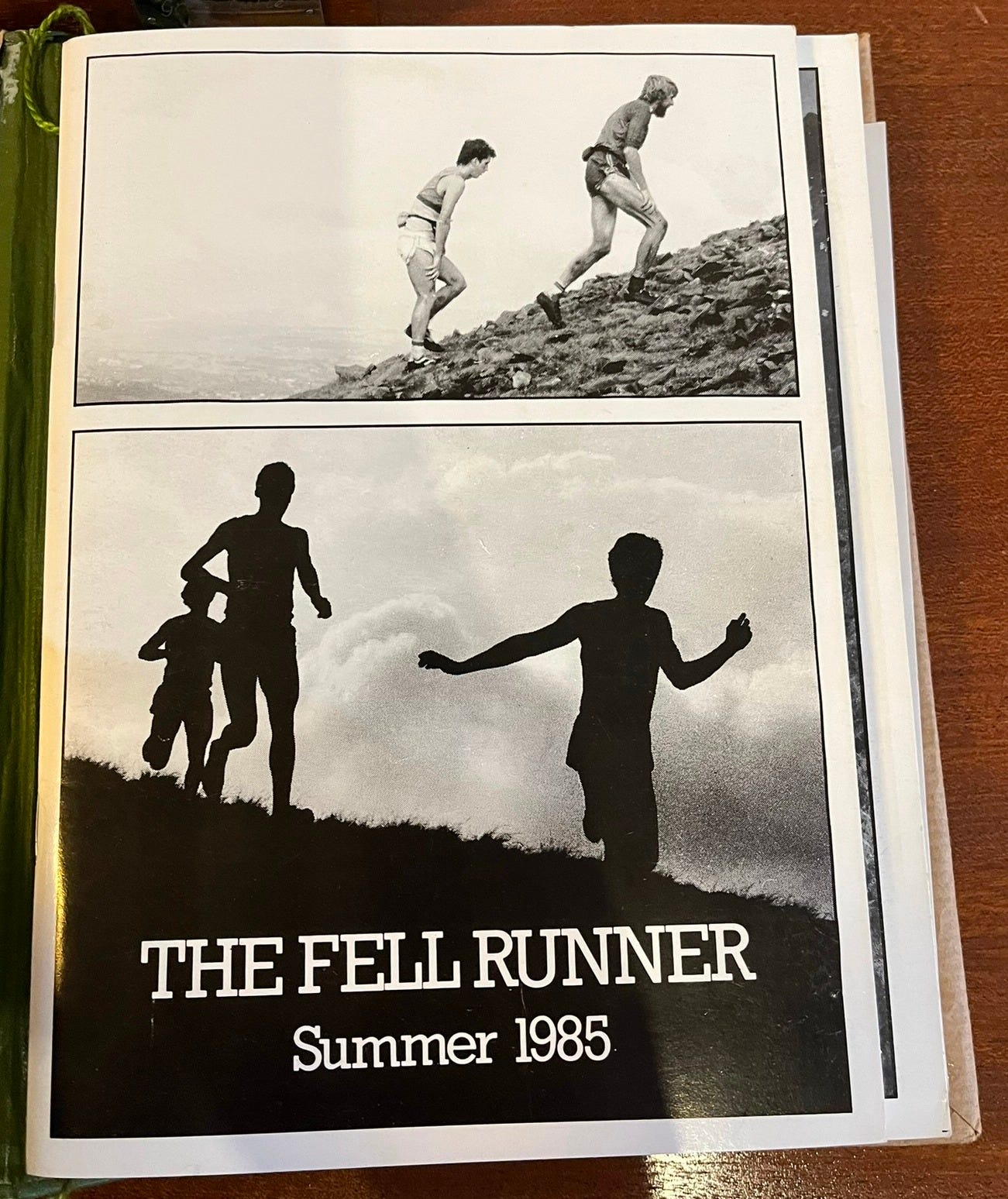Are our best days behind us, or are they yet to come?
Ageing athletes: When are you literally over the hill?
A few weeks ago, I was sat on a pub bar stool next to a great friend of mine playing out what can only be described as a ‘four-pint rumination pity party’ on ageing.
Early in the day, we’d been on the fells. It had not helped.
For us, mileage was once recorded in double digits and altitude gain was ‘the higher the better’, all fuelled by gels and machismo. We were young and lithe and had strong sinew carved out of the very Lakeland stone we ran on. We mocked any deity’s attempt to thwart us through stormy weather.
Two almost fifty-year-old blokes now replace this vision.
Nowadays, we trundle on a low-level 4-mile ramble with a cheese sandwich interval - only because it was sunny and the light drizzle had merely threatened to stop play. Occasionally we had been sprayed with the divots kicked up by brightly lycra-clad fell runners moving with grace and passing us with pointlessly annoying enthusiasm as they paused for Instagram selfies.
We easily concluded our best days are very much behind us.
But is it true? And if it is even slightly true what are the implications for us more ageing athletes (a term I’m now using more generously)?
It invites reflection on the nature of ageing, fulfilment, and achievement. But is it even the right question to ask? We can use insights from nature, psychology, philosophy and even economics, to challenge this assumption and explore why, for many people, including me, the best may be yet to come.
From a physiological standpoint, pasting the midpoint can become a phase of vitality and growth if approached with attention to fitness, nutrition, mental health, and lifestyle habits. But looking through this physiological lens there is a little gloom…
Muscle mass naturally decreases with age due to sarcopenia, which begins as early as our 30s and accelerates in later years. Muscle fibres tend to lose size and strength, and without regular resistance training, it can lead to loss of overall power. However, with consistent strength training, muscles can be rebuilt and maintained well into the later decades of life. Muscle mass is a major factor for balance, joint support, and metabolic health, all of which can help make these years feel strong and active.
Bone density peaks in our 20s and gradually declines with age, increasing the risk of fractures. For women especially, menopause can lead to a significant drop in bone density, but it can be preserved with weight-bearing exercises, proper calcium and vitamin D intake, and possibly other dietary supplements.
As we age, cardiovascular efficiency can decline, with the heart potentially becoming less efficient at pumping blood, and the risk of hypertension and heart disease increasing. Regular aerobic exercise, like walking, running, or swimming, supports heart health and can help to keep blood vessels flexible, reducing blood pressure and the risk of cardiovascular issues.
There are plenty of gnarly old Lakeland fell runners in vests and post-1970s inappropriate micro shorts to bear testament to the benefits of regular exercise. These heroes of ageing walk among us.
Cognitive processing speed may slow with age, but this doesn’t necessarily mean a decline in intelligence or memory. Studies show that cognitive exercises such as reading, learning new skills, and mental challenges, can support neural plasticity. Moreover, the emotional intelligence and self-awareness gained over decades can bring a positive and resilient mindset.
Psychology: Happiness peaks later than we think
One way to challenge the assumption that our best days are behind us is to look at the data on happiness and ageing. Research in psychology consistently shows that happiness does not decline after midlife, as many fear. Instead, studies indicate that happiness tends to follow a U-shaped curve, with many people experiencing a dip in their 40s, followed by increasing life satisfaction into their 50s and beyond.
A study by economists David Blanchflower and Andrew Oswald, analysing over 500,000 people across various countries, found that happiness bottoms out around age 47.2 but increases steadily afterwards. By the time people reach their 50s and 60s, they often report higher life satisfaction than in their 30s. This suggests that midlife can be the start of an upward trajectory, rather than a downward slide.
“It is not that we have a short time to live, but that we waste a lot of it.”
The Stanford Centre on Longevity also found that older adults report higher emotional well-being, partly because they become better at regulating their emotions and focusing on what truly matters to them. According to Laura Carstensen, director of the centre:
“As people age, they shift their focus toward positive experiences and away from negative ones. They become more selective in how they invest their time and energy, and this shift makes older people generally happier.”
From an economic standpoint, life after 50 can offer more freedom than earlier years. In our 20s and 30s, many of us are busy building careers and financial security. By the time we reach 50, the fruits of those efforts often allow for a greater focus on personal fulfilment, new ventures, and even second careers.
As Sarah Harper, professor of gerontology at Oxford University, argues, longer life expectancies mean that 50 is no longer considered “old” in many cultures. Instead, it’s a time when people have the financial and emotional bandwidth to take risks and pursue passions - such as spending time in the fells even if it is shorter!
Economically speaking, income often stabilises by midlife, and the pressures of early career advancement or child-rearing may lessen. People in their 50s often have greater financial flexibility to make choices that align with their personal values, from travel to starting a business to spending more time with loved ones and taking up new hobbies. As the philosopher Seneca once wrote:
“It is not that we have a short time to live, but that we waste a lot of it.”
Philosophy: A new view of time and meaning
Philosophically, the notion that our best days are behind us reflects a linear, and perhaps limiting, view of time. I often coach from a position shared by the Stoic philosopher Marcus Aurelius who advised:
“The happiness of your life depends upon the quality of your thoughts.”
This resonates with research in positive psychology, which shows that our perceptions of life - whether we believe we’re on a downward slope or an upward climb - are influenced by how we frame our experiences.
Similarly, Viktor Frankl, the psychiatrist and Holocaust survivor, believed that meaning could be found even in the most difficult circumstances. His philosophy of logotherapy teaches that life’s purpose is not found in the past, but in the present and future, through the meaning we attach to it. Frankl’s famous quote speaks directly to the power of agency at any age:
“Everything can be taken from a man but one thing: the last of the human freedoms - to choose one’s attitude in any given set of circumstances.”
Rethinking “Best” Days
The assumption that our best days are behind us relies on a narrow view of age, success, and fulfilment.
Psychology shows that happiness can increase after midlife, while economic trends reveal that many people find new professional and personal fulfilment well into their 50s and beyond. Philosophy, meanwhile, reminds us that meaning and purpose are not fixed in the past but continuously shaped by our choices.
So next time you’re on the fell enjoy the sandwich and the view. Rather than asking if our best days are behind us, perhaps from the vista of a bar stool or mountain top we should ask: How can we make the most of the days ahead?
Stuart Rimmer MBE is a mountain lover, educationalist, performance coach, strategy consultant and now 'very former' endurance athlete; living and working between London and Cumbria. He is the founder of innermountaincoach.com, author of children’s book The Wisdom of Murphy, and A Stoic Reckoning: Why Stoicism is True.











Thanks so much for the kind comments. So pleased it resonated. I think there are some great examples there of the benefits. As I wobble on the precipice of 50 it affirms I’m on the right track! Thanks!
The best days our lives are all of the ones that we fully embrace with a 'gusto' worthy of an Oscar. A recent health diagnosis made me fully aware that it is not what has passed but what you do in the moment that is far more important. Make everyday matter to you and your loved ones, try not to focus on the aching muscles or the forgetful moments...these are what makes us unique and much more lovable 😉